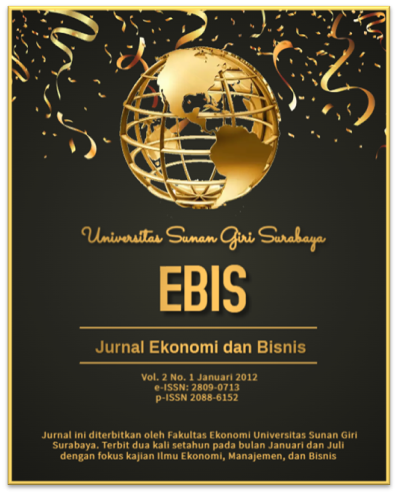Kontribusi Dari Beban Kerja dan Fasilitas Kerja Sebagai Penentu Niat Berpindah Kerja
Keywords:
workload, work facilities, turnover intentionAbstract
The purpose of the current study is to identify the factors of turnover intention to change jobs based on the contribution of workload and work facilities. This research will use causal research with quantitative methods. As an analytical tool this research will use multiple linear regression methods. The sample size of this study was 86 employees of PT. ABC is the total number of employees working in the company. The findings of this study reveal that workload and work facilities do affect the turnover intention. Every organization has different dynamics and needs, so it's important to take the right steps. The workload continues without improving working conditions, so the turnover intention to become stronger. Likewise for work facilities which require investment in good work facilities so that they play an important role in minimizing the turnover intention.
References
Andayani, D. & D. Darmawan. (2011). Determinan Variabel Kepuasan Kerja, Komitmen Organisasi, Kinerja Karyawan Sebagai Kontributor Perilaku dan Kinerja Organisasi Berbasis Keunggulan Bersaing, Jurnal Ekonomi dan Bisnis, 1(2), 35-54.
Baskoro, T., B. Siswanto, D. Darmawan & A. Kirana. (2002). Hubungan Kualitas Kehidupan Kerja dan Kinerja Pegawai Negeri Sipil, Jurnal Bisnis dan Manajemen, 2(2), 129-142.
Bowling, N. A., & C. Kirkendall. (2012). Workload: A review of causes, consequences, and potential interventions. Contemporary Occupational Health Psychology: Global Perspectives on Research and Practice, 2(2), 221-238.
Carswell, C. M., C.H. Lio, R. Grant, M.I. Klein, D. Clarke, W.B. Seales, & S. . Strup,(2010). Hands-free administration of subjective workload scales: acceptability in a surgical training environment. Applied Ergonomics, 42(1), 138-145.
Damayanti, N., S. Hutomo, D. Darmawan & I. Wahyudi. (2011). Penelitian Tindakan Kelas, IntiPresindo Pustaka, Bandung.
Darmawan, D. (2006). Konseptualisasi Variabel Disiplin Kerja, Jurnal Media Komunikasi Ekonomi dan Manajemen, 5(1), 30-39.
Darmawan, D. (2007). Budaya Organisasi dan Pengaruhnya terhadap Kebebasan Pengambilan Keputusan Manajerial, Jurnal Media Komunikasi Ekonomi dan Manajemen, 5(2), 40-53.
Darmawan, D. (2007). Strategi Pengembangan Sumber Daya Manusia, Pustakamedia Daya, Bandung.
Darmawan, D. (2008). Variabel Semangat Kerja dan Indikator Pengukurannya, Jurnal Kewirausahaan, 2(1), 43-49.
Darmawan, D. (2011). Pengaruh Karakteristik Individu, Kompensasi dan Modal Sosial terhadap Loyalitas Kerja, Jurnal Ilmu Sosial, 5(3), 135-146.
Dubinsky, A. J., T.W. Dougherty, & R.S. Wunder. (1990). Influence of Role Stress on Turnover of Sales Personnel And Sales Managers. International Journal of Research in Marketing, 7(2-3), 121-133.
Earle, H. (2003). Building A Workplace of Choice: Using The Work Environment To Attract and Retain Top Talent. Journal of Facilities Management, 2(3), 244-257.
Fitriyani, F. I., D. Lembong, I. Zaidi & D. Darmawan. (2011). Pengaruh Hubungan Kerja dan Kompleksitas Kerja terhadap Niat Berpindah Kerja melalui Stres Kerja. Jurnal Ekonomi, Bisnis dan Manajemen, 1(1), 23-36.
Gopher, D., & E. Donchin. (1986). Workload: An examination of the concept. In K. R. Boff, L. Kaufman, & J. P. Thomas (Eds.), Handbook of Perception and Human Performance, Cognitive Processes and Performance, John Wiley & Sons.
Gunawan, A., Y. Yuliana, D. Darmawan, & S. Arum. (2012). Manajemen Terapan dan Bisnis, Spektrum Nusa Press, Jakarta.
Hassanain, M. A. (2006). Factors Affecting The Development of Flexible Workplace Facilities. Journal of Corporate Real Estate, 8(4), 213-220
Hutomo, S. & D. Darmawan. (2011). Optimalisasi Manajemen Sumber Daya Manusia Menuju Keunggulan Bersaing, Jurnal Ilmu Sosial, 5(1), 13-22.
Idris, N. H., Budiyanto & D. Darmawan. (2004). Pengaruh Kompetensi, Kedisiplinan, Interaksi Sosial dan Regulasi Diri terhadap Prestasi Kerja Karyawan. Jurnal Bisnis dan Manajemen, 4(1), 17-30.
Khasanah, H., S. Arum, & D. Darmawan. (2010). Pengantar Manajemen Bisnis, Spektrum Nusa Press, Jakarta.
Miller, S. (2001). Workload Measures. National Advanced Driving Simulator. Iowa City, United States.
Ningwulan, E. P., D. Akhmal & D. Darmawan. (2012). Studi tentang Kesan Dukungan Organisasi dan Keseimbangan Kehidupan Kerja untuk Membentuk Perilaku Inovatif Karyawan. Jurnal Ekonomi, Bisnis dan Manajemen, 2(2), 103-116.
Novrianda, D., T. Agustin & D. Darmawan. (2012). Kontribusi Norma Subjektif dan Lingkungan Kerja untuk Mengembangkan Profesionalisme. Jurnal Ekonomi, Bisnis dan Manajemen, 2(1), 47-58.
Oetomo, H. & D. Darmawan. (2004). Pengaruh Aspek Pendidikan, Pelatihan, Umur dan Pengalaman Kerja terhadap Perilaku Gaya Kepemimpinan, Jurnal Ekonomi-Manajemen, 3(2), 11-22.
Qureshi, M. I., R.A. Jamil, M. Iftikhar, S. Arif, S. Lodhi, I. Naseem, & K. Zaman. (2012). Job Stress, Workload, Environment and Employees Turnover Intentions: Destiny or Choice. Archives Des Sciences, 65(8). 230-241.
Razali, M. N. & D. Darmawan. (2006). Kepemimpinan dan Kepercayaan Diri: Kajian tentang Upaya Meningkatkan Kinerja Karyawan. Jurnal Bisnis dan Manajemen, 6(2), 145-160.
Roelofsen, P. (2002). The Impact of Office Environments on Employee Performance: The design of the workplace as a strategy forproductivity enhancement. Journal of Facilities Management, 1(3), 247-264.
Rusman, N. S., D. Darmawan, & N. Othman. (2007). The Study of Organizational Citizenship Behavior: The Role of Professionalism and Experience. Jurnal Bisnis dan Manajemen, 7(1), 21-34.
Santosa, A. & D. Darmawan. (2002). Hubungan Kepemimpinan, Budaya Organisasi dan Kinerja Karyawan, Jurnal Ilmu Manajemen, 3(2), 81-92.
Sjamsi, N. & D. Darmawan. (2004). Peran Strategis Layanan pada Penyelenggaraan Pelayanan Publik, Jurnal Administrasi Publik, 1(1), 83-95.
Sogawa, D., S. Nitanai, K. Shiokawa, K. Horiguchi, M. Moriyama, Y. Nakada, Y. Ichikawa, K. Adachi, T. Ochiai, & H. Hagino. (2002). Universal Design and The Workplace: Guidelines On How Universal Design Contributes To Asset Value And Facility Function, Paper Presented At The International Conference For Universal Design, Yokohama, November/December, 1-10.
Wahyudi, I, D. Bhaskara, D. Darmawan, Hermawan & N. Damayanti. (2006). Kinerja Organisasi dan Faktor-Faktor Pembentuknya, Jurnal Ekonomi dan Bisnis, 4(2), 95-108.
Wang, D. (2011). Research on the Influence of Working Pressure on Turnover Intention of New Employees. In 2011 International Conference on Management and Service Science, IEEE, 1-4.





